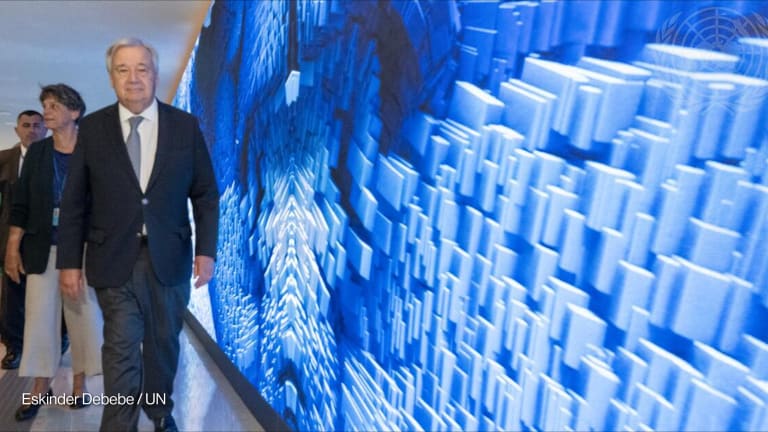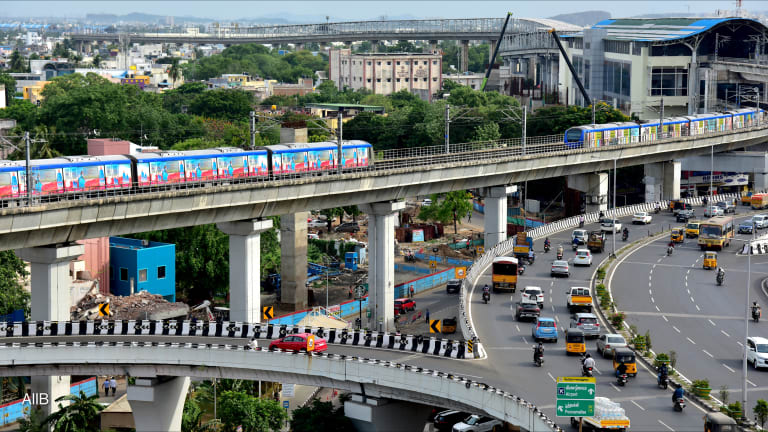Opinion: 3 tips for coping with aid's budget crisis
Budget tightening means finding new ways to do business. United Nations Assistant Secretary-General and U.N. Development Programme Asia-Pacific Director Haoliang Xu gives three tips for rethinking your agency's model.
When former General Electric boss Jack Welch said: “If the rate of change on the outside is faster than the rate of change on the inside, then the end is near,” the first wave of digital transformation was sweeping the world. This insight enabled him to turn GE into a “learning company” that thrived in the new environment. The change in the development world has been no less profound, and the United Nations Development Programme has had to match it, lest our end approach too. In the 1990s, official development assistance to Asia-Pacific nations accounted for more than 10 percent of all financial flows in the region. Today, that figure is less than 1 percent. Countries’ own domestic resources now dwarf foreign aid — and this has had dramatic consequences for the UNDP budget. Our “donor agency” business model was unsustainable: The UNDP could not continue as a “donor” because we no longer had the resources to pass on to governments. There was one way out. The UNDP had to demonstrate its relevance in practice, without ODA in countries where we operate, and instead become an advisor and development services provider that would charge fees for services governments demanded. I’ve spent the past 10 years working to achieve this transformation. In 2007, I led the reinvention of the UNDP in Kazakhstan, after contributions fell off a cliff when the country moved into the middle-income category. Later, as U.N. assistant secretary-general and UNDP’s Asia-Pacific director, I had to revamp 24 country offices, after their corporate budgets were chopped by half. Here are three tips for staying relevant in the face of deep budget cuts. 1. Define your relevance in the new environment. This is the most important part of your response strategy. You need to examine how your external environment has changed, and define how you will continue to add value. We found that countries most valued strategic policy advice reflecting on development experience in other countries, successful solutions tested in other countries and access to the global development system. Governments told us that they trusted the UNDP for its neutrality, considered us a critical contributor to their development and wanted us to continue supporting them. Despite this, we could not continue as before. We had to stop being a donor and start being an advisor and development services provider, financed by ODA as well as the governments of our program countries. In the new reality — where domestic finance accounts for 89 percent of all money, while ODA is less than 1 percent — the governments of Asia-Pacific countries are our primary clients. They would “co-finance” our project work and offices if we clearly demonstrated how we can continue to add value to their development. To achieve that, we needed to transform into a client-oriented advisor that provides top quality strategic policy advice, solutions tested in other countries and access to the global development system. 2. Change your culture. Achieving cultural change and transforming attitudes in an organization has to be an open and participatory process. We used a management meeting to get buy-in from all the senior managers in our 24 country offices. We then sent a series of written and video messages describing the changing world, the falling contributions to the UNDP and the need to evolve. We introduced a repositioning initiative and held workshops, conferences and town hall meetings. We used social media for discussions about strategy and implementation. Improving efficiency was key. Our analysis showed that it took two UNDP staff members in Asia-Pacific to do the job of one UNDP staff member in Latin America. We launched right-sizing processes in three country offices in 2015, another eight in 2016, and the restructuring will continue this year. We reduced staffing by 500 posts, but we also invested in training and hiring new experts to help countries address emerging issues such as how to cultivate innovation, get the private sector engaging in the Sustainable Development Goals and create jobs for young people. As a result, the downsizing didn’t affect the value of what we delivered overall, which remained at about $1 billion a year. 3. Innovate, innovate and then innovate some more. Make innovation part of everything you do. Even when your organization is a bureaucracy with rigid processes, find ways to infuse innovation and new thinking in all areas of your work. Using an innovation fund, with support from Denmark, we created a network of Innovation Champions across country offices. We ensured internal visibility and recognition for their initiatives. Some 1,600 staff members participated in an idea competition about how to engage governments in co-financing arrangements. We then approached Asia-Pacific governments with an offer of high quality advisory and implementation services to help them meet SDGs. The results have been spectacular. We quadrupled revenue from governments to nearly $120 million, and increased the number of country offices that had co-financing agreements with governments to 18 from four. It showed that there was demand for the UNDP’s services, even if bringing in sizeable ODA is no longer possible. Leveraging our core financing, we invested $2 million into producing sophisticated climate change projects that have so far attracted more than $200 million in new resources from the Green Climate Fund for six countries in the region. We have also explored ways of engaging private capital. We signed the first large financial contributions to the UNDP from individual contributors — the amounts range from $2 to $5 million. We have also launched a social impact investing fund to implement projects bringing measurable social and environmental benefit as well as profit for the private sector. In all of this, innovation was key. We celebrate our innovation successes and learn from failures. This is key to keeping the rate of change on the inside faster than on the outside. Defining your relevance anew, changing your culture and encouraging innovation have no doubt helped us to move toward a 21st century development organization. But the development community, including the UNDP in Asia-Pacific, will continue to need a lot of soul searching and structural changes to remain relevant to Agenda 2030. Devex delivers cutting-edge insights and analysis to the leaders shaping and innovating the business of development. Make sure you don't miss out. Become a Devex Executive Member today.
When former General Electric boss Jack Welch said: “If the rate of change on the outside is faster than the rate of change on the inside, then the end is near,” the first wave of digital transformation was sweeping the world. This insight enabled him to turn GE into a “learning company” that thrived in the new environment.
The change in the development world has been no less profound, and the United Nations Development Programme has had to match it, lest our end approach too.
In the 1990s, official development assistance to Asia-Pacific nations accounted for more than 10 percent of all financial flows in the region. Today, that figure is less than 1 percent. Countries’ own domestic resources now dwarf foreign aid — and this has had dramatic consequences for the UNDP budget.
This story is forDevex Promembers
Unlock this story now with a 15-day free trial of Devex Pro.
With a Devex Pro subscription you'll get access to deeper analysis and exclusive insights from our reporters and analysts.
Start my free trialRequest a group subscription Printing articles to share with others is a breach of our terms and conditions and copyright policy. Please use the sharing options on the left side of the article. Devex Pro members may share up to 10 articles per month using the Pro share tool ( ).
The views in this opinion piece do not necessarily reflect Devex's editorial views.
Haoliang Xu is U.N. assistant secretary-general and UNDP assistant administrator and director for the Bureau for Policy and Programme Support.








